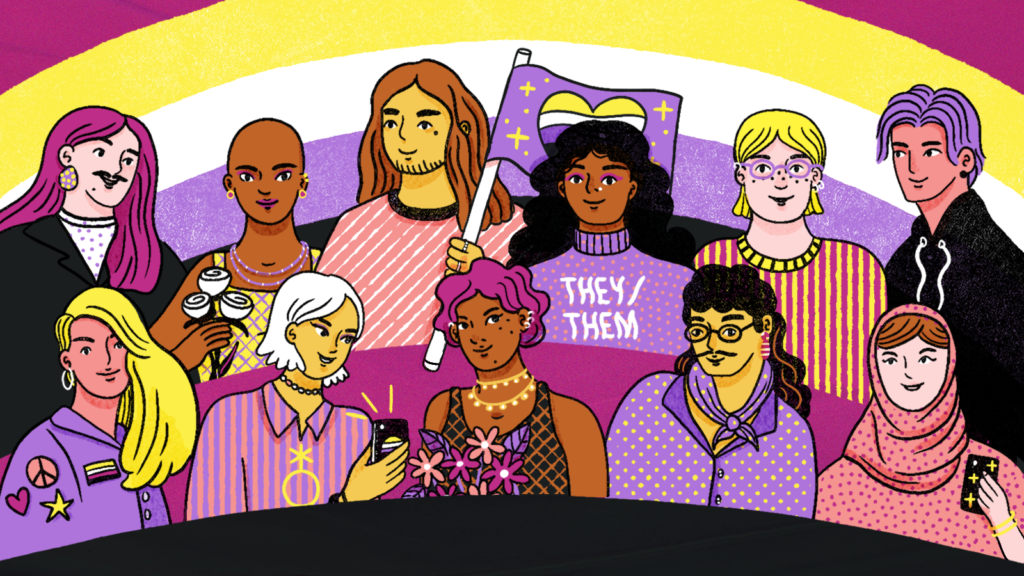10 Questions You Shouldn’t Be Asking Someone From The Community
The LGBTQIA+ community has been facing social, communal, and economic discrimination for decades now. For this community to gain momentum and popularity, it has taken a great amount of effort and energy. A community so diverse and strong should be respected and treated equally. A person who doesn’t belong to the community is less likely to know the basics. When we contact someone from the community for the first time, we tend to have an insensitive approach even when we do not have such intentions. The right thing to do is to be prepared and be insightful at all times. Here’s a list of questions you shouldn’t be asking.
*Trigger warning – some questions may come off as offensive or hurtful. We don’t intend on any of it. We are here to help decode a lot of misinformation the Indian population has around the community. Feel free to stop reading at any point if you feel triggered.

1. Are you sure you are *insert reference*?
Okay, we are all curious to know but asking someone if they know what they are is like doubting their sexuality. Definitely hurtful. Everyone has the liberty to own up to their likes and dislikes, and we shouldn’t be cross-questioning choices.
2. How did you come out?
Not all people have it easy. The experiences differ greatly. For example, when Kurt Hummel in Glee told his father he is gay, his father welcomed him with open arms, but when Siddhartha Pakam in Grand Army told his parents, they reacted as if it were nothing but a misunderstanding. So, asking someone about their journey isn’t always the right thing to do. Memories might come rushing in, which may sour. I want to add that the phrase coming out is losing preference; many people don’t wish to use it anymore. Quoting Karamo Brown from Queer Eye, “I believe that the term ‘coming out’ is a bit antiquated and outdated in a sense [that] it gives the power to someone else to accept or deny you when, in actuality, what the process is, is that we’re letting people into our lives.’’

3. Were you born a “girl” or a “boy”? What part do you have down there? Did you get your surgery done?
What’s in someone’s pants is no one’s business. Asking someone about their at-birth biological identity is offensive. Particularly asking Trans people isn’t just rude but also inappropriate. It is nonetheless an invasive medical-oriented question to ask about one’s surgery. Also, it is a popular misconception that all transgender and gender-nonconforming want to get the surgery done. It is up to them if they feel secure in their body or not.
4. So, how do you have sex?
Asking people in same-sex relationships and transgender people how they have sex is – i) a personal question ii) not open for the assumption. We shouldn’t assume, and on the whole, asking what a person does with their parts is just creepy.

5. What bathroom do you use?
For many people, this is a touchy issue. For example, sometimes, people are forced to use a bathroom with a label they don’t associate with due to strict laws. Hence, one mustn’t ask such questions.
6. Who do you prefer more? (asking a bi-sexual)
Some bisexuals may be okay answering this, but it isn’t the same for everyone. As the attraction is subjective, bisexuals have their opinions of it. If a person identifies as bisexual, it means they are attracted to both men and womxn hence asking who is more favored is just vague. Subsequently, people ask lesbians, “did a man hurt you?’’. But no, lesbians have their own reasons to be interested in females, and bringing a man into the frame isn’t always the best thing to do.
7. You’re not into me, are you? (amongst friends)
This is a ubiquitous question pansexuals/gays/bisexuals/demisexuals get to hear in a friend circle. It not only makes one feel uncomfortable but also conscious of their actions. If such a question is asked, the person from the community may not express themselves completely or be free. They will have to consider other’s interpretations of their actions instead of being open themselves. It hampers their social wellbeing. Nevertheless, just because I am pansexual doesn’t mean I have a crush on the entire friend group. People don’t understand this. We are at fault when we automatically think that the other person is interested in us. Barring from the question, it is important to know the misunderstanding can lead to adverse consequences. For example, Kevin Keller in Riverdale became a victim of beating when a stranger misunderstood his intentions due to his friendly nature.

8. You don’t like sex? (Asking an asexual)
Asexuals encounter this a lot. Asexuals can have their own idea of pleasure, and asking them if they like sex or not is simply nonsensical. Do they get to hear things such as how you know it when you have never experienced it? Or maybe someone who has actually experienced it is questioned with statements such as “don’t let one bad experience ruin the fun for you’’. From the point of view of an asexual, it is an innate feeling. They just know it. Florence in Netflix hit series Sex Education was one such character. Otis would casually tell her she isn’t ready yet or hasn’t found the right person, but the truth was that she was not ‘’hungry’’ for sex. In her own words, it seemed like a feast she wasn’t hungry for.
9. Isn’t it just a phase?
Umm NO. It is not a fashion trend that comes and loses popularity after some time. It is not a phase, not a choice. Just like asking a person if they are “sure’’, this question too invalidates a person’s identity. Also, if a person is questioning, it is still not okay as sexuality is not synonymous with a “phase.’’
10. Who is the man in the relationship?
Yes, the orthodox norms say only a man and woman make a couple but using this idea to judge someone’s character in their relationship is plain insane. Not only is the role being judged, but we are also going by the physical appearance. We expect that even if the relationship has two females, we think one of them is likely to be more “masculine’’. LGBTQIA+ parents get to hear this too, such as who is the father figure? Or does the child address both of you as ‘’mom’’? What the parents want their children to call them is their decision and not something for others to care about.
These questions are a mere extract. There are so many more questions the community is asked, in schools, at home, in the workplace and in other social settings. Yet, this gives an idea as to what is inconsiderate. Even if you are not sure if something you are asking is offensive or not, ask yourself, how would you feel if someone is interrogating you with the same questions? It for sure feels like someone is popping your privacy bubble and invading personal space. The wisest thing to do is let the other person open up at their desired pace.
Featured Graphic: Vijaya Srivastava
Author

